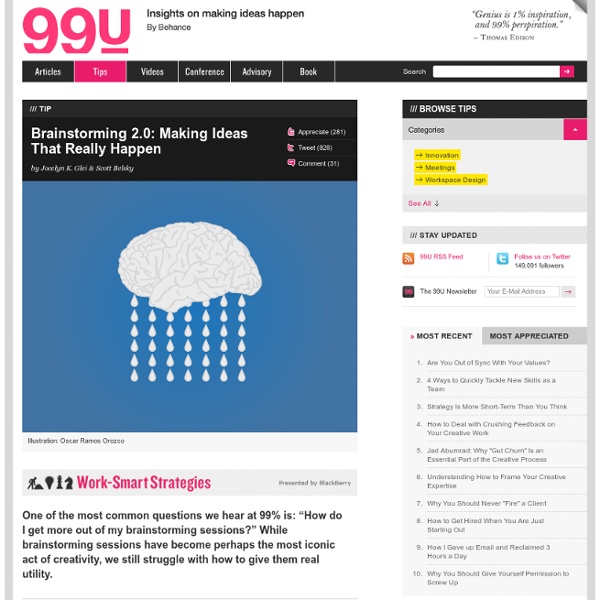Brainstorming 2.0: Making Ideas That Really Happen

UNdata
The Future of Advertising
Google Scholar
How Technology is Recreating the 21st-century Economy
W. Brian Arthur, PARC Visiting Researcher series: Entrepreneurial Spirit 4 August 20115:30-7:00pmGeorge E. about PARC forum description Every 50 years or so a new body of technology comes along and slowly transforms the economy. Brian Arthur -- an external professor at the Santa Fe Institute, pioneer of complexity theory, and longtime PARC Visiting Researcher – will attempt to answer these and other questions in this PARC Forum talk. Digital technology runs deeper than merely providing computation, internet commerce, and social media. presenter(s) W. Arthur pioneered the modern study of positive feedbacks/ increasing returns in the economy -- in particular, their role in magnifying small, random economic events -- and this work became the basis of our understanding of the high-tech economy. Arthur was the Morrison Professor of Economics and Population Studies at Stanford University, and the first director of the Economics Program at the Santa Fe Institute in New Mexico. audio
Union of Intelligible Associations
The Rise of the New Global Elite - Magazine
F. Scott Fitzgerald was right when he declared the rich different from you and me. But today’s super-rich are also different from yesterday’s: more hardworking and meritocratic, but less connected to the nations that granted them opportunity—and the countrymen they are leaving ever further behind. Stephen Webster/Wonderful Machine If you happened to be watching NBC on the first Sunday morning in August last summer, you would have seen something curious. This diagnosis, though alarming, was hardly unique: drawing attention to the divide between the wealthy and everyone else has long been standard fare on the left. This widening gap between the rich and non-rich has been evident for years. In a plutonomy there is no such animal as “the U.S. consumer” or “the UK consumer”, or indeed the “Russian consumer”. Before the recession, it was relatively easy to ignore this concentration of wealth among an elite few. But the financial crisis and its long, dismal aftermath have changed all that.
BASE (moteur de recherche)
Un article de Wikipédia, l'encyclopédie libre. BASE est un moteur de recherche développé dans le cadre du projet Open Archives Initiative par l'Université de Bielefeld (Allemagne). Il est fondé sur la technologie Fast Search & Transfer (en), et a contribué au projet européen Digital Repository Infrastructure Vision for European Research (en) (DRIVER). BASE effectue l'indexation automatique des bibliothèques numériques utilisant le protocole Open Archives Initiative Protocol for Metadata Harvesting (OAI-PMH). Il se distingue d'autres moteurs de recherche par sa spécialisation académique, la capacité de trouver des ressources appartenant au Web profond (ou Web invisible, non indexé par les moteurs commerciaux), l'utilisation de la recherche plein texte et la présentation des résultats de recherche accompagnés des données bibliographiques. Moteur BASE Portail sciences de l’information et bibliothèques
The 'Trophy Kids' Go to Work
Refdoc
Refdoc est momentanément indisponible pour cause de maintenance. Nous vous prions de nous en excuser et vous invitons à vous reconnecter ultérieurement surwww.refdoc.fr
Related:
Related:



